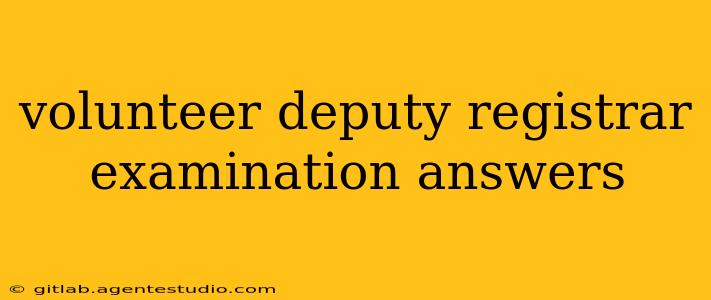Becoming a volunteer Deputy Registrar is a commendable act, contributing significantly to the smooth functioning of elections. This guide aims to provide comprehensive answers to common questions encountered in the volunteer deputy registrar examination. Please note that specific questions and answers will vary depending on your location and the governing electoral body. This information is for general guidance only and should not be considered legal advice. Always refer to your specific examination materials and local electoral guidelines.
Understanding the Role of a Deputy Registrar
Before delving into potential examination questions, let's establish a clear understanding of the Deputy Registrar's role. A Deputy Registrar is a vital part of the election process, responsible for assisting with various tasks, including:
- Voter Registration: Helping eligible citizens register to vote, ensuring accuracy and compliance with regulations.
- Voter Information: Providing clear and accurate information to voters regarding registration deadlines, polling locations, and voting procedures.
- Election Day Support: Assisting at polling stations with voter verification, ballot distribution, and other election-day tasks.
- Maintaining Records: Accurately maintaining voter registration records and other relevant documentation.
- Promoting Civic Engagement: Encouraging participation in the democratic process.
Common Examination Topics & Sample Answers
The following sections address common topics that typically appear in volunteer Deputy Registrar examinations. Remember that the specific questions may differ, but the underlying principles remain consistent.
1. Voter Eligibility and Registration
Q: What are the key requirements for voter eligibility in [Your State/Region]?
A: (This answer must be tailored to your specific location. Generally, it includes factors like age, citizenship, residency, and potentially additional requirements.) For example, in many jurisdictions, a citizen must be 18 years of age or older, a resident of the state/region, and not currently incarcerated to be eligible to vote. Specific residency requirements (length of time) will vary. It’s crucial to know the exact regulations in your area.
2. Voter Registration Procedures
Q: Describe the steps involved in registering a new voter using the online registration system.
A: (This answer must be tailored to your specific online registration system.) Generally, it will involve guiding the applicant through a series of steps, including providing personal information (name, address, date of birth, etc.), verifying their identity (potentially using a driver's license or other official document), and confirming their eligibility. The online system will guide the applicant through the process, and the Deputy Registrar's role is to assist with any technical issues or questions the applicant might have. Accurate data entry and adherence to data privacy protocols are critical.
3. Handling Voter Inquiries
Q: How would you respond to a voter who is unsure of their polling location?
A: I would politely ask for their name and address to verify their registration. Using the official voter database, I would then locate their assigned polling place and provide them with the exact address, including any special instructions (e.g., building access). I would also confirm the polling place's operating hours. If I am unable to find their information, I would guide them on how to locate this information independently through official channels, such as the election website.
4. Election Day Procedures
Q: Explain the process of verifying a voter's identity at the polling place.
A: The process typically begins by asking for the voter's name and address. This information is then cross-referenced against the official voter registration list. Depending on the jurisdiction, additional identification may be required. Once the voter's identity is confirmed, they are given a ballot. The process must be conducted fairly and impartially, ensuring the secrecy of the ballot.
5. Maintaining Confidentiality and Data Security
Q: What measures would you take to ensure the confidentiality of voter information?
A: All voter information is treated as strictly confidential and is protected under [mention relevant laws/regulations]. I would only access this information for official election-related purposes. I would never share any voter information with unauthorized individuals or organizations. I would follow all data security protocols, including secure storage of documents and electronic data, and adhere to any guidelines concerning password management and data access.
Conclusion
This guide provides a framework for preparing for your volunteer Deputy Registrar examination. Remember to thoroughly review all provided materials and familiarize yourself with your specific jurisdiction's election laws and procedures. Your dedication and accurate understanding of these procedures will contribute to a fair and efficient election process. Good luck!

